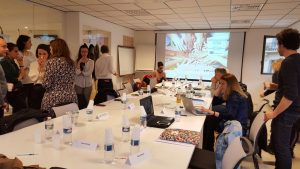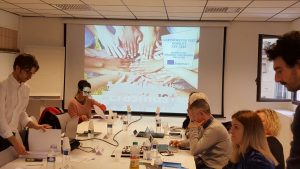
Visual identity of the project
COORDINATOR:
Chambre de commerce Italienne pour la France de Marseille
PARTNERS:
CONSORZIO PEGASO NETWORK
ITAKA TRAINING
CAMERA DI COMMERCIO ITALO-ELLENICA GREEK-ITALIAN CHAMBER OF COMMERCE OF THESSALONIKI
OMILOS UNESCO NEON THESSALONIKIS
RÉGIE DES ECRIVAINS
ABROAD CONSULTING LTD CO. KG
ITALIENISCHE HANDELSKAMMER FUR DEUTSCHLAND
CAMERA DI COMMERCIO E INDUSTRIA ITALIANA PER LA SPAGNA CCIS
IES CONSULTING
ASOCIACIÓN ESPAÑOLA DE ESCUELAS DE SEGUNDA OPORTUNIDAD
EUROSUD
KØBENHAVNS KOMMUNES UNGDOMSSKOLE
DET DANSK-ITALIENSKE HANDELSKAMMER I DANMARK
CAP ULYSSE
PROJECT DESCRIPTION
The ‘Europe 2020’ strategy sets ambitious goals which aim to promote intellectual, inclusive and sustainable growth throughout the European continent. One of the reasons for which these objectives risk not being accomplished is the elevated rate of youth unemployment in many European countries. In order to fully harness the potential of these young individuals the ‘Europe 2020’ goals must be sought after and met. It is essential we guarantee a quality formation and instruction process, including enhanced mobility throughout the Union and an efficient integration of the world of education into the job market. Often times, this integration process ignores those youth whom have low basic skills or low levels of qualification. market.
The target audience of our project consists of young Europeans between 18 and 29 years of age who lack basic competencies , this situation is mainly caused by social, economic, geographical obstacles, this may include individuals that follow formational processes or who belong to the NEET category. It is more complicated for this targeted group to develop abroad mobility paths which improve their basic and transversal skills. Our target audience instead, have quite a bit of difficulty in developing their own projects abroad or finding a job in another member state of the EU hence, significantly limiting their mobility. The aim of our proposal is that of encouraging and sponsoring mobility projects for NEET and youth with low qualifications in order to identify what their key skills are and empower them in that sector keeping in mind territorial improvements which their formation impacts. The individuals which will activate these mobility projects will be hence, the harbingers of both a personal as well as local business transformation. For this reason the project mainly involves small businesses which are linked to local development and strongly influenced by the socio-economic history of the region. The productive sectors are those of artistic or traditional handicraft, cultural, agriculture and fishing as well as social services. Develop a new type of mobility path and work experience for the target group that provides them the development and acquisition of the 8 key skills sought and the methodologies of these skills in a formative pamphlet and ‘Euro pass Mobility’.
Our first objective is to overcome the difficulties by creating a network of companies and training agencies at European level that develops and share models of work experiences and mobilities, specifically designed for the target group.
The focus on core competencies combined with the life skill is justified by the fact that both are abilities that lead to positive behaviors, encouraging the adaptation to various situations and enabling people to deal effectively with the demands and challenges of everyday life.
The Life Skills instead make the person capable of transforming the knowledge, attitudes and values in real capabilities, able to know what to do and how to do it. The project works on three key areas for employment and social integration.
PLANNED ACTIONS :
- Research of formation entities and businesses on the national level as long as they abide by the European network of businesses that can host individuals with low level qualifications and formation agencies that are able to organize and support the different stages.
- Develop a platform that gestates this network
- Setting up events in different partner organizations throughout Europe to introduce the network and the cultural platform.
- Conduct an encounter at the national level of with the young participants , the agencies and those responsible for the formation training in order to collectively understand how to organize and improve the internships.
- Short-term joint staff training events for tutors and individuals responsible for the formation aspect of the project .
- Blended mobility of young people of each country to try out the methodologies and evaluate them.
The project involves 17 partners from 7 different countries, with expertise in the field of education, social inclusion and employment of young people and relationships with businesses and the local organizations.



